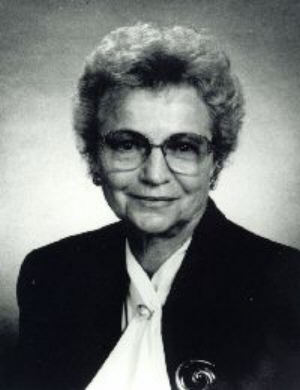Japanese Disaster Recalls Nuclear Industry History In Great Lakes Bay Area
|
||||||||||
| Printer Friendly Story View |

One of the reactors erected at the Midland nuclear plant of Consumers Power, as shown in this construction photo, was eventually used at a plant in Toledo.

Mary Sinclair, community activist on nuclear power issues, died recently at age 92 in Massachusetts.
Attempts to build more power generating capacity in the mid-Michigan area have created controversy several times.
Now, local uncertainty and an international nuclear crisis have made it less likely that this area has a nuclear future even as increased coal generation remains under study.
Nearly 42 years ago a six member panel of experts on nuclear energy came here and warned on Delta College public television of the dangers of building a nuclear plant near Midland.
It was Dec. 18, 1969 at a news conference with those experts at the Bay City Country Club that Mrs. William D. (Mary) Sinclair spoke up opposing the proposed Consumers Power Co. plant.
The Midland Daily News, in an unsigned front page article the next day (written by this columnist as a stringer) headlined "Midland N-plant project debated."
Mary Sinclair had testified Dec. 3, 1969, before the Atomic Energy Commission, asserting that her opposition was based on the conjecture that radioactive wastes might be released into the Tittabawassee River and could have adverse genetic effects on humans.
Not entirely an inexperienced concerned citizen, Mary Sinclair had inherited an attitude of "speaking truth to power" from her father, a union miner in Minnesota during the Depression, according to her son, Peter Sinclair, of Midland. She also had abstracted research reports for the Atomic Energy Commission and had worked for The Dow Chemical Company.
The panel members were split in their opinions about the dangers of environmental pollution from a nuclear plant and one panelist, Col. J. Stephen Gadler of the Minnesota Pollution Control Agency, also cited a physical danger from nuclear plants, pointing out that some accidents had occurred.
Among other issues, opponents contended the plant would be built too close to the city and was sited on unstable ground too close to the Tittabawassee River. The fears about unstable ground proved true, causing cracked foundations and extra cost.
According to Dorothy Langdon Yates, Midland historian, the plant was to have been first nuclear facility in the world to co-generate electricity and steam. It also was hoped low cost power from the plant would make Midland more competitive with other Dow locations.
The debates that arose in Midland between supporters of the nuke plant and those who, like Mary Sinclair, feared it, have gained new meaning in reawakened controversy in the U.S. in the wake of an earthquake induced disaster at a nuclear power plant in Japan.
Mary Sinclair, who died recently at age 92 in Massachusetts, had attended the College of St. Catharine in St. Paul, Minnesota, before marrying a lawyer, Midland native Bill Sinclair.
Despite volatile negative reaction, Mary Sinclair persisted in her activism against the plant, later winning national awards and a profile on "Sixty Minutes" by CBS-TV after the plant was canceled in 1984.
Even as it was trying to build at Midland, the utility also was attempting to move east of Bay City with another nuclear plant proposal. Opposition to a nuclear plant there was less vocal but the plant was not built.
Consumers Power Co. notified the U.S. Atomic Energy Commission in August 1974 that it was withdrawing its application to build a 2.3-million-kilowatt nuclear plant near Quanicassee. The company said it was withdrawing the application because of current market conditions for utility securities.
The plans for a nuclear plant in Midland began in 1967. But during 17 years of sporadic construction, hearings and protests ensued and the Nuclear Regulatory Commission changed its guidelines repeatedly, believed to be in reaction to the Three Mile Island partial core meltdown in 1979. Among protesters was a young Michael Moore, now a famed filmmaker and activist.
In 1978 John D. Selby, Consumers president, who also was chair of the policy committee on nuclear power of the Edison Electric Institute, told a Congressional committee that unresolved issues at the construction permit stage exposed utilities to financial impairment. Increased costs that resulted ultimately were borne by consumers, he testified, urging resolution of all issues at the licensing stage.
Mr. Selby pointed to considerable success by Consumers with nuclear, including a Big Rock Point plant completed in three years in 1960 and a Palisades plant completed in less than six years in 1972. Big Rock has since been retired, and the site returned to greenfield.
"Congress should reaffirm its basic conviction that more nuclear plants should be built and operated safely and provide a licensing process which allows judgments on nuclear power plant to be made on their merits," said Mr. Selby.
On July 16, 1984, the Consumers board of directors voted to cancel the Midland N-project, which then was 85 percent complete.
The estimated $4 billion cost of the plant nearly bankrupted Consumers and impacted the state of Michigan that had guaranteed some of the bonds. The costs were passed to the ratepayers of Consumers and assessed on electric bills over many years.
After legal jousting with Dow, that had hoped to gain steam from the plant for Midland operations, in 1986 the plant was converted to natural gas at a cost of $500 million and today operates as the highly successful Midland Co-generation Facility recently acquired by a Swedish-American partnership.


The EQT Infrastructure Fund (EQT Infrastructure), of Stockholm, Sweden, in partnership with FORTISTAR, of White Plains, New York, have acquired the Midland Co-generation Venture Limited Partnership (MCV or the Company) from funds and other entities managed by GSO Capital Partners, Rockland Capital Energy, The Dow Chemical Company and other entities.
MCV is one of the largest gas fired co-generation projects in the United States. The facility is capable of producing up to 1,560 megawatts of electricity and up to 1.35 million pounds per hour of process steam for industrial use. It serves both Dow and Dow Corning plants in Midland.
Latest power-stoked opposition is to a proposed $2.3 million coal-fired addition to the Karn-Weadock plant of Consumers Energy at the mouth of the river in Hampton Township.
That proposal was deferred last year even after the Michigan Public Service Commission had granted approval for an air permit after a long planning process.
Consumers Energy had expected that its new clean coal unit at Karn/Weadock would begin commercial operation in 2017. Analysis shows the project, if completed, will have a net economic impact on Michigan of $1.2 billion, create 1,800 construction jobs at peak, about 2,500 indirect jobs, and more than 100 permanent jobs after the plant is operating.
The utility has the oldest fleet of coal plants in the nation with an average age of 50 years.
The analysis also points to a key environmental benefit of the new clean coal unit. according to the company: "Eventually replacing several of the company's older, less efficient plants with an advanced supercritical pulverized coal plant will significantly reduce the company's system-wide emissions and have a positive impact on the air quality in Michigan."
The analysis explains how the Balanced Energy Initiative approach could provide the following emissions reductions by 2018 from the company's coal fleet from today's levels: sulfur dioxide, down 91 percent; nitrogen oxides, down 83 percent, and mercury, down 81 percent.
In addition, the Balanced Energy Initiative portfolio could reduce carbon dioxide emissions from the utility's coal fleet by 10 percent to 15 percent, before further potential reductions can be gained through carbon capture and sequestration.
The Balanced Energy Initiative of Consumers calls for investing more than $6 billion over the next five years, including energy efficiency, renewable energy, environmental and customer service enhancements, and new power generation.
During her many years in Midland, Sinclair was a technical writer and researcher for The Dow Chemical Co. and Dow Corning Corp. as well as a science writer and editor for trade journals in the chemical and plastics fields. She also abstracted nuclear research reports by the Atomic Energy Commission - now the Nuclear Regulatory Commission - in Washington, D.C. Sinclair raised concerns about the safety of the plant throughout the time it was under construction.
"We used the legal system and got a lot of information out to the public that wouldn't have gotten out any other way," Sinclair said in a 2008 interview with the Midland Daily News.
In Sinclair's opinion, had the nuclear plant been in operation during the flood in the fall of 1986, it might have resulted in a meltdown.
"I always thought, 'Thank God I stopped it.' That (a meltdown) would have been a real tragedy for the Saginaw Valley and Great Lakes."
Sinclair remained convinced that nuclear power is an unsafe and unwise option.
"No, I don't think it's a viable answer at all," she said. "I don't think we've tried to use natural gas at the optimum level we should. Natural gas doesn't have the type of emissions that a coal-fired plant does. And it doesn't have the waste a nuclear plant does, and the threat of a nuclear meltdown."
Because of extensive natural gas supplies in the mid-Michigan area, some observers feel that any expansion at Karn-Weadock could use that type of supply. The present plant already is mainly powered by natural gas and oil, with coal a supplemental source.
The lesson to be learned after all these years of controversy and cost is that Mr. Selby undoubtedly was right: utilities should have certainty when issued a license for a new plant.
Otherwise, the consumer pays.
| Printer Friendly Story View |
|
|

Dave Rogers |
|
|
|
Printer-Friendly Story View
0200 Nd: 04-21-2024 d 4 cpr 0
12/31/2020 P3v3-0200-Ad.cfm
SPONSORED LINKS
12/31/2020 drop ads P3v3-0200-Ad.cfm


